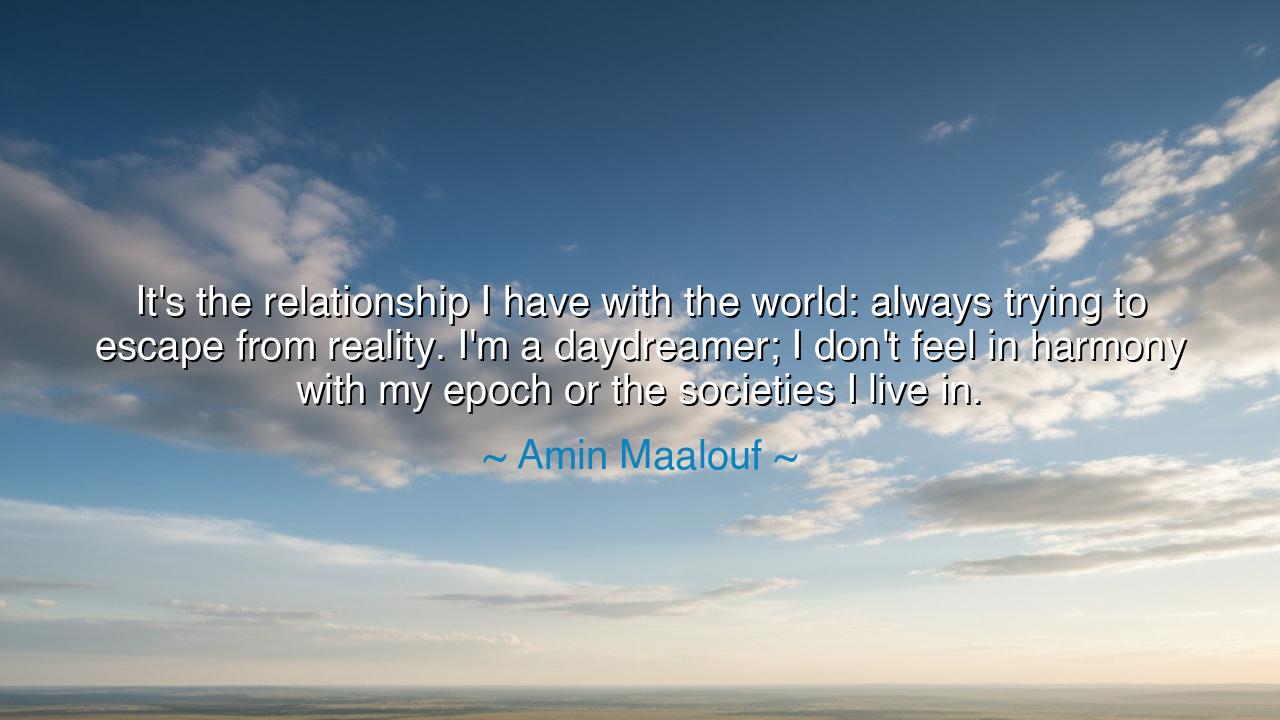
It's the relationship I have with the world: always trying to
It's the relationship I have with the world: always trying to escape from reality. I'm a daydreamer; I don't feel in harmony with my epoch or the societies I live in.






The poet of exile and memory, Amin Maalouf, once confessed: “It’s the relationship I have with the world: always trying to escape from reality. I’m a daydreamer; I don’t feel in harmony with my epoch or the societies I live in.” In this lament he reveals the ancient sorrow of the outsider, the one whose soul does not fit the mold of his time. His words echo the cries of prophets, artists, and wanderers who have always felt estranged from the world around them, longing for a truer home beyond the veil of appearances.
To be a daydreamer is both a gift and a burden. It grants the spirit wings to soar above the confines of the present, to imagine other realms where justice, beauty, and truth prevail. Yet it also alienates, for the dreamer is never fully at ease among the common pursuits of society. What others embrace as reality, he finds shallow or cruel, and thus he flees into visions of what could be, rather than bowing to what is.
Maalouf speaks too of his relationship with the world, strained and restless. For the epoch, with its wars, its divisions, its obsessions with power and wealth, cannot contain the spirit that yearns for harmony. The dreamer feels himself adrift, belonging not to the hour in which he was born, but perhaps to some future yet to come—or to an age long past where he imagines humanity walked closer to truth.
Yet in this alienation lies also heroism. For those who do not feel at home in their societies are often the ones who transform them. The daydreamer plants seeds of vision that later generations will harvest. Though mocked or misunderstood in his own time, his longing for harmony is not wasted; it is the quiet fire that keeps hope alive in a world too easily content with imperfection.
So let this lesson endure: if you feel out of step with your epoch, do not despair. For perhaps you are called to see what others cannot, to dream what others fear, to challenge the world not by conforming to it, but by revealing a vision beyond it. The relationship with reality may be uneasy, but from such unease springs the music of prophets, the wisdom of poets, and the courage of all who dare to dream against the tide.






NVNgoc Vu
Amin Maalouf’s reflection on feeling disconnected from society and using daydreaming as a form of escape resonates with many people today. It seems like there’s a tension between trying to find personal peace and staying engaged with a rapidly changing world. Do you think it’s possible to find harmony in today’s society, or is it a constant struggle to maintain a sense of belonging?
MNMinh Nguyen
The idea of feeling out of harmony with the world is something I can relate to. Sometimes, the pace of modern society feels overwhelming, and daydreaming can be a form of retreat. Do you think that constantly trying to escape reality is unhealthy, or can it be a form of self-preservation in a world that doesn’t always feel right for us?
MN10CSi-21- Pham Thi Minh Ngoc
Maalouf’s quote makes me wonder about how many people feel out of place in their own time. If you’re always trying to escape reality, does that mean you’re missing out on the present moment, or is it a natural response to a world that feels disconnected from your personal values? What do you think it means to not feel in harmony with the world around you?
DCDue Dung Can
Amin Maalouf’s words strike a chord with me. It seems like he’s describing a sense of disconnection from the world around him, something many of us might feel at times. Do you think that daydreaming is a form of escape from an overwhelming reality, or does it suggest a deeper need to find a place or time where we truly feel at peace?